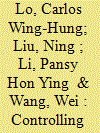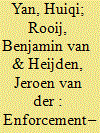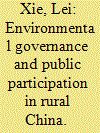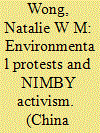|
|
|
Sort Order |
|
|
|
Items / Page
|
|
|
|
|
|
|
| Srl | Item |
| 1 |
ID:
146887


|
|
|
|
|
| Summary/Abstract |
For more than two decades, under the imperative of ‘developing the country at all costs’, local governments in China have allowed developers and industrialists to set up polluting industries which have had deleterious effects on citizens’ health and the natural environment. However, China appears to have entered a new phase of determined and concerted efforts on the part of both the authorities and the public to tackle environmental problems. The articles in this special issue of China Information examine the main strengths and weaknesses of China’s current system of environmental governance. The central questions linking the case studies reported here are concerned with whether and how environmental policies formulated at the central level are implemented at the local level and how different agents and interests, making use of the available legislative means, influence this implementation process. Engaging a range of political, economic, social and cultural perspectives, the five contributions in this collection concentrate on two broad issues: resolution mechanisms for public participation in environmental governance and the actual enforcement of environmental regulations.
|
|
|
|
|
|
|
|
|
|
|
|
|
|
|
|
| 2 |
ID:
146892


|
|
|
|
|
| Summary/Abstract |
This article traces the institutional development of environmental regulation in urban China, using data from three rounds of surveys of enforcement officials in the Guangzhou Environmental Protection Bureau in 2000, 2006 and 2013. We found that the changes to institutional contexts of regulatory control appear mainly in the fluctuating degree of support from various non-state actors, but not from government entities and regulated industries. While we detected visible organizational changes in local environmental enforcement bureaus, there was also organizational stability. First, the quality of enforcement officials has improved, as reflected by a higher level of education, first from 2000–2006 and then from 2006–2013. Second, the perceived value of enforcement officials in environmental protection was considerably enhanced in the period 2000–2006, and then remained stable from 2006 to 2013. Third, enforcement obstacles in terms of administrative ambiguity remained virtually unchanged from 2000 to 2013, while enforcement power deficit, resource scarcity and procedural ambiguity became more severe. Overall, the general perception of enforcement effectiveness at both the unit and organizational levels has remained the same over the past 13 years, whereas individual-level enforcement was perceived to have become more effective (with significant changes mainly taking place from 2006 to 2013). On the basis of these empirical results, we found that the institutional conditions for stricter enforcement in Guangzhou were visibly improved from 2000 to 2006, but only modestly improved between 2006 and 2013.
|
|
|
|
|
|
|
|
|
|
|
|
|
|
|
|
| 3 |
ID:
146891


|
|
|
|
|
| Summary/Abstract |
This article, in a study of amoral cost–benefit analysis, legitimacy and capacity to obey the law, seeks to understand why Chinese farmers obey or break pesticide rules. It uses data gathered through intensive fieldwork at a local level, including interviews with 31 pesticide experts and officials and 119 vegetable farmers in central China. It uncovers an enforcement–compliance paradox: a situation where law enforcement concentrates exactly on those rules that are least likely to be broken and on those regulated actors who are most likely to comply. It finds two explanations. First, enforcement policy simply may not be aware of which rules are more likely to be complied with and which regulated actors are more likely to comply even when there is limited deterrence. Second, technocratic risk-averse enforcement policy may be oriented towards those rules and actors for which violation – theoretically – results in the greatest damage, not towards those rules that are more likely to be broken and those actors who are more likely to break them.
|
|
|
|
|
|
|
|
|
|
|
|
|
|
|
|
| 4 |
ID:
146890


|
|
|
|
|
| Summary/Abstract |
This article investigates participatory environmental management in rural China. It first summarizes the extent, role and key drivers of public participation in environmental politics in China. It then investigates main scenarios of interaction between the Chinese public and the state, in order to assess the array of possibilities for political participation in environmental matters. This comparative study of public participation in environmental management focuses on grass-roots initiatives that point to increasing public enthusiasm for policymaking processes. The article concludes that participatory practices have impacted significantly upon environmental governance by facilitating implementation and bettering policy and, to a certain extent, legitimizing the discretion of environmental protection agencies. The article also indicates that grass-roots deliberative participation has successfully achieved its goal of improving the provision of social services and public goods. While the government’s initial approach was to improve policy implementation without triggering political contestation, at grass-roots level this strategy has created a sense of political awareness.
|
|
|
|
|
|
|
|
|
|
|
|
|
|
|
|
| 5 |
ID:
146888


|
|
|
|
|
| Summary/Abstract |
Protests in post-Mao China not only indicate citizens’ increasing dissatisfaction but also challenge the regime to act and take appropriate measures. This article discusses local government response to environmental activism within China’s decentralized political structure. Anti-incinerator protests in Beijing and Guangzhou are used to illustrate the emergence of public participation in municipal policymaking on waste management. The Beijing and Guangzhou governments’ different attitudes and responses to citizens’ grievances are analysed, particularly in light of a new public-consultative waste management mechanism implemented in Guangzhou, the Guangzhou Public Consultation and Supervision Committee for Urban Waste Management (广州市城市废弃物处理公众咨询监督委员会). Changes in policies on waste management and disposal are examined through documentary analysis and in-depth interviews with stakeholders involved in anti-incinerator protests. The main goal here is to demonstrate that policy change is not only determined by protest outcomes, but that it is also greatly affected by the responses of local governments and actors within a framework of advocacy coalition. This study throws new light on Chinese policymaking on environmental issues and it re-appraises studies of environmental management in China.
|
|
|
|
|
|
|
|
|
|
|
|
|
|
|
|
| 6 |
ID:
146889


|
|
|
|
|
| Summary/Abstract |
In the last five years China has passed new regulations and formulated new policies to target urban smog. Accordingly, several cities have sought to improve their public transportation systems to reduce the number of motor vehicles on the streets. In 2011 in Nanjing, during the construction of Line No. 3 of the subway system, several long-standing London plane trees in the city’s historical area were targeted for transplantation. This article focuses on the tree-hugging protest which was triggered by this event in 2011–12. While protesters framed their actions as tree protection and heritage conservation, this article is particularly interested in participatory approaches available to protesters, in light of certain recent developments in the environmental regulatory framework in China. Specifically, this article analyses a relatively new and less well-known tool for popular participation known as ‘green assessment’.
|
|
|
|
|
|
|
|
|
|
|
|
|
|
|
|
|
|
|
|
|